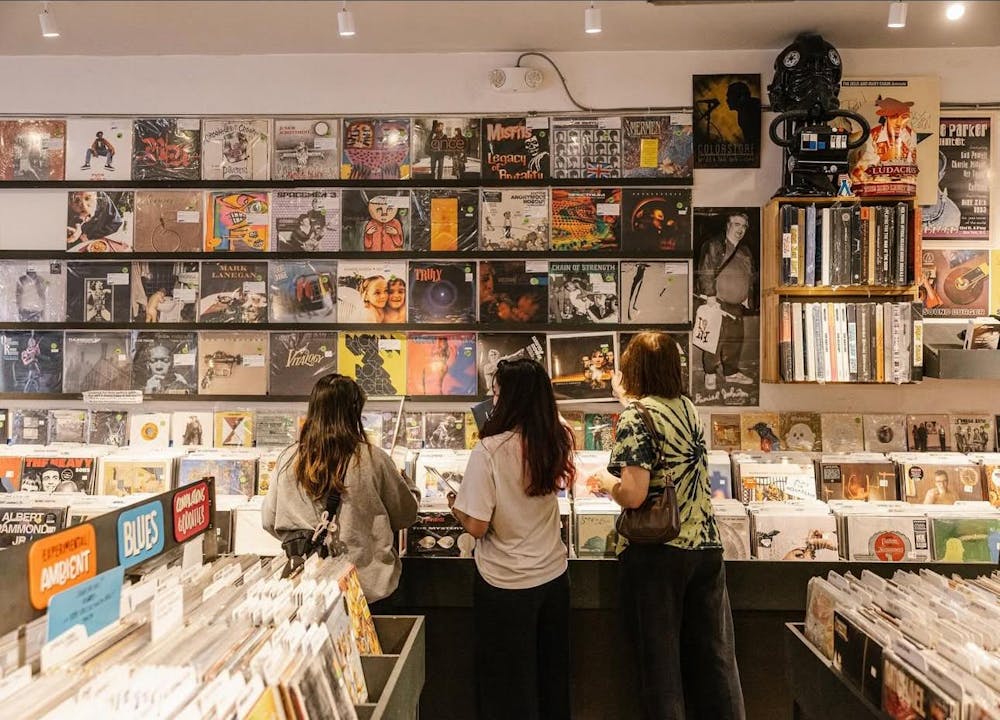As streaming platforms continue to dominate music revenue, the resurgence of vinyl and physical music sales has introduced newer generations an experience of music listening that streaming has been unable to replicate.
According to The Recording Industry Association of America, in its 2023 annual report, revenues from vinyl grew to $1.4 billion, a 10% increase, and accounted for 71% of physical format revenue.
Physical music sales have seen a resurgence in the past few years, but streaming has continued to take over music sales, with a total of $17.7 billion at estimated retail value in 2024.
Stinkweeds Records, a local record store in central Phoenix, is one of the many independent record stores in the Valley.
Dario Miranda, who has worked at Stinkweeds for 20 years, says that he has seen a big shift in both younger and older generations returning back to vinyl.
According to Miranda, one of the possible reasons for vinyl becoming increasingly popular again is because people are looking for a different music experience that moves away from digital platforms.
“Like anything else, if something is just you push a button and it happens, you haven’t really invested anything into that experience,” Miranda said.
Lizzy Geer and Ellyn McDonald, both vinyl collectors in the Valley, have been collecting vinyl for the past decade, growing up with CDs as kids and had parents who also owned vinyl as kids.
For Geer and McDonald, buying vinyl is a nostalgic experience that helps them to discover new music and reminisce over old favorites.
“I think it's like a good method of discovery, and preserving history at the same time,” McDonald said. “I feel like I discover more in a physical space than like I would by the algorithm recommending me things in a circle.”
Miranda says the experience of shopping at a record store allows people to support their local communities and discover new music.
“Shopping at a record store, maybe opens your mind up a little more to things that you're not familiar with, cause you’re surrounded by music that you don’t know and genres that you don’t know,” Miranda said. “So just being in that environment, maybe makes you a little more curious.”
Streaming and online platforms remain one of the most popular ways to listen to music. Still, with evolving algorithms and the use of artificial intelligence, new music recommendations are increasingly based on what listeners are already interacting with.
Brett Reed, director of the Music Industries Program at Paradise Valley Community College, says that the ability to release music is easier than ever, but advertising the music to audiences has become more difficult.
According to Reed, the process of releasing music has shifted away from the traditional record label. Artists no longer need a label to get their music out into the world. However, Reed says that without a label there is an element of curation that is lost.
“The record store kind of tells us some of those kinds of stories. You go in there, and someone has put together a collection of music and organized it meticulously, so that there is some sensibility about where things are,” he said.
This curation has not only shifted from record labels, but also changed how artists release music. Many artists are opting to release one-off single tracks rather than a full collection of songs, speeding up the process of releases.
According to Reed, streaming has also had a huge impact on music releases, as listeners can rely on algorithms to show them new music.
“The album has been for a long time the unit, and streaming because, even listening to albums is kind of challenging, or and if you just drop in on a track, the algorithm's gonna kick you to some other track anyway,” Reed said.
For many avid record collectors and music lovers, the experience of vinyl gives them something more than streaming.
“I think there's something nice about physically putting something on the record player and maybe it has a poster or maybe the vinyl is a different color,” Geer said. “Like it's something special than just hitting play on your phone.”
Record stores like Stinkweeds work to cultivate community and promote the experience of truly listening to music by supporting local artists and focusing on the music.
“It should be about the music, and records definitely promote that idea that it is about the music,” Miranda said.

